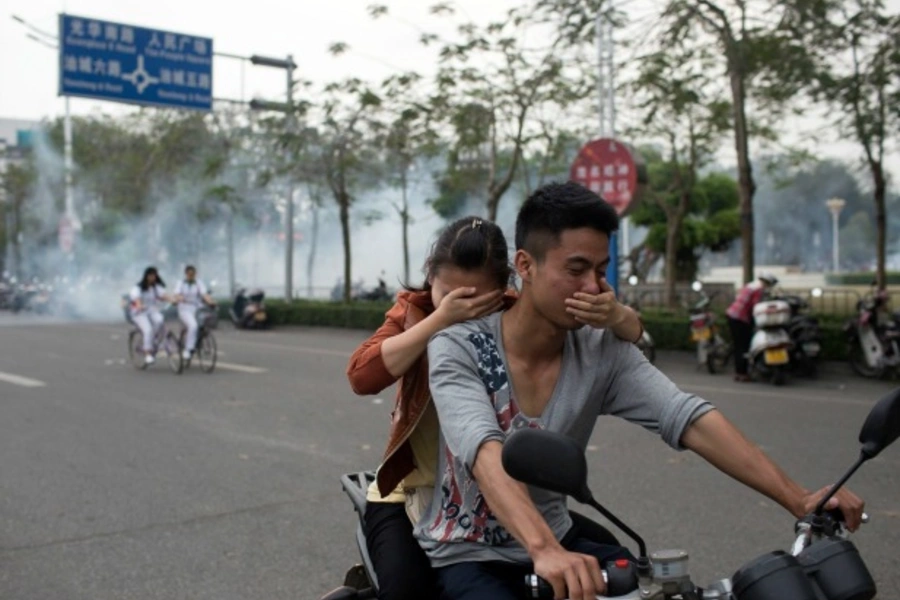Friday Asia Update: Top Five Stories for the Week of April 4, 2014

More on:
Lauren Dickey, Darcie Draudt, Charles McClean, Will Piekos, and Sharone Tobias look at the top stories in Asia today.
1. Tensions rise on the Korean Peninsula. South and North Korea exchanged artillery fire across a disputed martime border off the peninsula’s western coast on March 31. Neither side aimed at land or military installations, but 100 of the 500 rounds from North Korea fell south of the boundary, followed by 300 South Korean artillery shells shot into the northern side of the boundary. The incident occurred not far from Baengnyeong Island, where in March 2010 North Korean torpedoes sunk the South Korean warship Cheonan. The artillery barrages follow increased protests and heightened rhetoric from Pyongyang in response to annual joint U.S.-ROK military drills.On April 1, South Korea discovered a small unidentified drone, which Seoul alleges came from North Korea, shortly after the exchange of fire on Monday on Baengneyong Island. Following these events and amid rising tension, South Korea announced on April 4, that it successfully tested a ballistic missile capable of reaching most of North Korea, which has been test-firing short- and mid-range missiles of its own in throughout March.
2. Philippines seeks UN arbitration over South China Sea dispute with China. Manila has submitted its claim to the tribunal that arbitrates maritime disputes under the UN Convention on the Law of the Sea (UNCLOS). Under its ‘nine-dash line,’ Beijing’s territorial claims encompass much of the South China Sea and overlap with the exclusive economic zones (EEZs) of Vietnam, Brunei, Malaysia, and the Philippines. Manila would lose 80 percent of its EEZ in the waters off the western Philippines if it accepted Beijing’s line. Chinese media have been dismissive of the claim and have thus far chosen to unilaterally reject UN arbitration of the dispute.
3. Environmental protests in China lead to arrests; four rumored to be killed. Thousands of residents in the southern Chinese city of Maoming protested a petrochemical plant this past week. One post on microblogging site Weibo claimed that four teenagers had been killed in the clashes, and many pictures showed paramilitary police throughout the city. Eighteen protesters have been detained, according to state media. Protests have also spread to other cities in the area, including Shenzhen and Guangzhou. The plant would produce paraxylene, or PX, a chemical used to produce plastic and polyester. Protesters have taken to the streets over PX plants before; citizens of Xiamen were able to get a plant moved to another city in 2007, and mass protests in Dalian in 2011 and Kunming in 2013 elicited similar promises. An opinion poll by Jiao Tong University in Shanghai found that 77 percent of respondents believe that environmental protection is now more important than economic growth.
4. UN court orders Japan to halt Arctic whaling. The UN’s International Court of Justice (ICJ) ruled that the Japanese government must halt its whaling program in the waters around Antarctica. The ruling ends a program that has captured more than ten thousand whales since 1988 in the name of biological research. The Japanese government has agreed to abide by the ruling, despite the central role of whaling in the Japanese culture. While the ICJ ruling is a whale of a win for environmental organizations, questions remain over whether Japan will find a way to keep hunting the mammals of the sea.
5. Human rights group finds Tibetans repressed in Nepal. Human Rights Watch released a report Tuesday documenting repression faced by Tibetans in Nepal, which they claim is a result of political pressure from China. Many of the 20,000 Tibetans in Nepal entered the country illegally from China, and at times are forcibly returned, in violation of an agreement between Nepal and the Office of the United Nations High Commissioner for Refugees. China has become a top foreign direct investor in Nepal in recent years, which Tibetans say has led to a crackdown by the Nepalese government on their community. The report claims a de facto ban on political protests against China in Nepal and that Tibetans have less freedom to promote their culture. Since 2009, more than 120 Tibetans in China have set themselves on fire to protest the government’s policies.
BONUS: North Korea reveals logo for its new space agency. North Korea’s National Aerospace Development Administration (NADA) revealed its new logo on Monday: a retro blue circle that is reminiscent of NASA’s earlier logo, though with a Joseon twist. Here, the Big Dipper “reflects the will of the space scientists of the DPRK to glorify Kim Il Sung’s and Kim Jong Il’s Korea as a space power,” according to North Korean state media agency KCNA [Korean]. The agency is overseen by the Korean Committee of Space Technology, which was reportedly founded in the 1980s. The pessimistically named NADA has had only one successful launch of a since-failing Earth-orbiting satellite in December 2012 that was promptly condemned by the UN Security Council.
More on:
 Online Store
Online Store